How to set up Laragon on a new Windows computer (part 5) - MailHog
Table of Contents
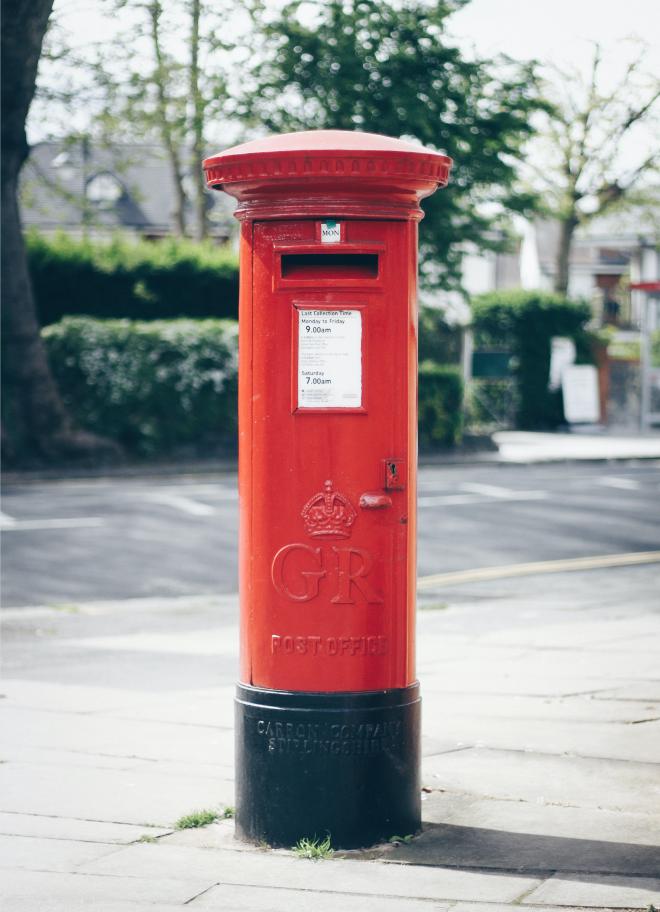
.env.example will use Mailpit as the default local mail provider. Mailpit is inspired by MailHog, it
has the same API. The author of Mailpit has completely rewritten Mailpit to be faster and better supported. Mailpit is
available as a free download from GitHub. Form information on how to install mailpit
see How to install mailpit on Windows and integrate with Laragon.Download MailHog #
Download MailHog from releases, the file for Windows is MailHog_windows_amd64.exe
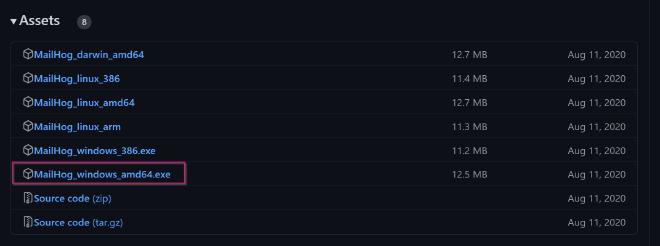
Copy to Laragon #
Create a directory in the laragon bin folder called mailhog
Copy the downloaded file and rename it MailHog.exe
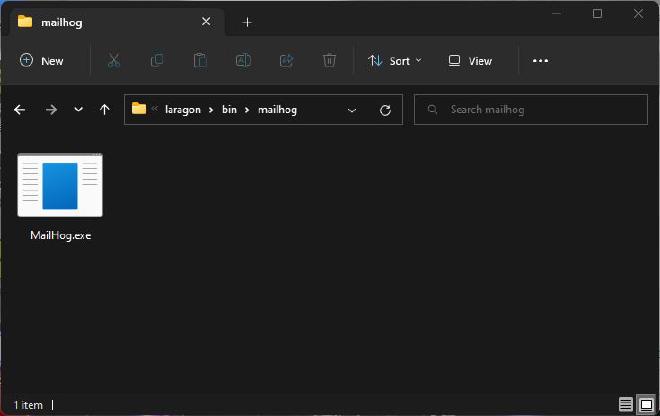
Hosts file #
Click the red h in the top right corner of Laragon, you will need to allow elevated privileges. By default, the C:\WINDOWS\system32\drivers\etc\hosts file will open in notepad++
Add the following lines above any Laragon magic:
# Manual
127.0.0.1 mailhog # Manual for laragon\bin\MailHog.exe
# Laragon magic
Save the file, you may need to allow elevated privileges again.
Autostart #
Open Laragon’s procfile (Laragon menu > Laragon > Procfile) and add these lines:
MailHog.exe : autorun MailHog.exe PWD=C:\laragon\bin\mailhog
MailHog Admin : autorun http://mailhog:8025
Every time Laragon starts the MailHog.exe will automatically run, in the background, and the MailHog admin website will launch.
App settings #
Any apps you create will need to be configured to use the following settings:
- mail protocol: smtp
- hostname: mailhog
- port: 1025
Example Laravel app:
MAIL_MAILER = smtp
MAIL_HOST = mailhog
MAIL_PORT = 1025
MAIL_USERNAME = null
MAIL_PASSWORD = null
The above settings are the default for a Laravel app! No further changes are required 🎉
Testing #
Start Laragon (or stop and start), the MailHog admin page should open in your default bowser.
To test it’s working, in any Laravel project, open a tinker console php artisan tinker. Send the welcome view by
email:
Mail::send('welcome', [], fn($message) =>
$message->to('admin@example.com')->subject('Testing MailHog'));
You should see = Illuminate\Mail\SentMessage {#4721}, the number will be different.
View the MailHog admin page in your bowser, click the inbox and the message to open it:
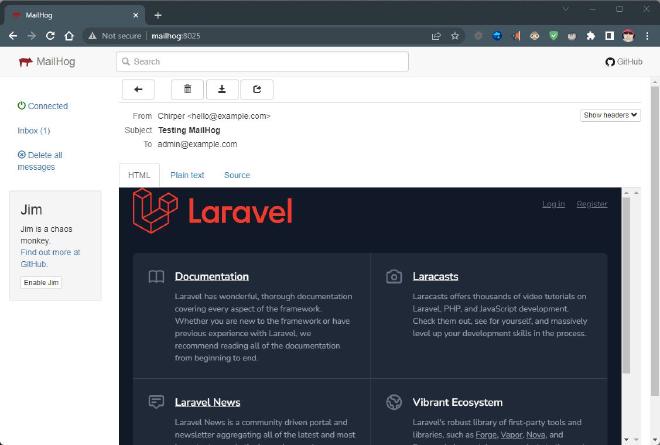
mail() settings #
Apps which use the PHP mail() function can be configured by editing the php.ini:
Laragon menu > PHP > php.ini, by detail it will open in Notepad++
Search (CTRL F) for mail function
Amend as follows:
[mail function]
; For Win32 only.
; https://php.net/smtp
SMTP = mailhog
; https://php.net/smtp-port
smtp_port = 1025
; For Win32 only.
; https://php.net/sendmail-from
sendmail_from = laragon@example.com
; For Unix only. You may supply arguments as well (default: "sendmail -t -i").
; https://php.net/sendmail-path
;sendmail_path =
; Force the addition of the specified parameters to be passed as extra parameters
; to the sendmail binary. These parameters will always replace the value of
; the 5th parameter to mail().
;mail.force_extra_parameters =
; Add X-PHP-Originating-Script: that will include uid of the script followed by the filename
mail.add_x_header = Off
sendmail_path = "C:/laragon/bin/mailhog/MailHog.exe sendmail"
Test mail() #
Open terminal (cmdr) and enter the PHP interactive shell.
php -a
In the PHP interactive shell type (or paste) the following:
mail('my_mail@example.com','Test', 'Test message', 'From: Laragon');
Open MailHog to view the message:
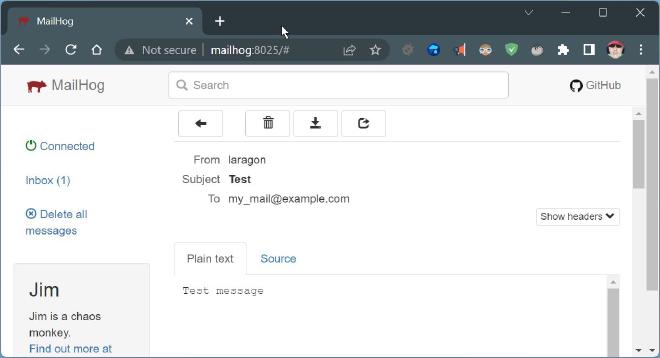
Stop MailHog.exe #
Laragon will start MailHog using the Procfile, however, it will not close the running service when Laragon is exited.
Command line #
One of the easiest ways is from the command line:
From the command line, MailHog can be verified if it’s still running:
tasklist | findstr /i /c:"MailHog.exe"
The output will be similar to:
MailHog.exe 9360 Console 1 11,188 K
To kill the process:
taskkill /im MailHog.exe /f
Which will output similar to:
SUCCESS: The process "MailHog.exe" with PID 9360 has been terminated.
This is dependent on the process being started as an administrator, or your account, you may need elevated privileges to stop it.
Task manager #
To end the MailHog.exe process using Task Manager:
- open Task Manager (Win start typing Task and press Enter when Task Manager displays as the first item)
- sort by process name by clicking the name heading, the cravat ^ should display
- expand all (under view dropdown)
- look down the list for Laragon (even if Laragon is closed, it will be shown under background processes)
- right-click MailHog.exe
- select End task
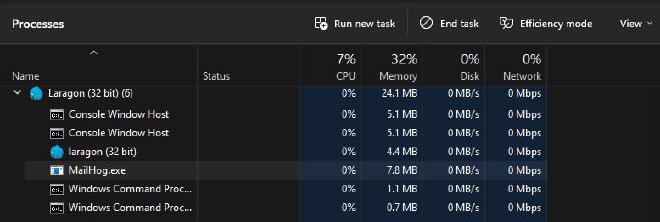
Personally, MailHog takes up 0.1% of memory and very little process, so I just leave it running, even after I close Laragon.
Further information #
Mailhog has a Chaos Monkey, inspired by Netflix. Which can randomly add faults. This can be used to test how your app responds to mail failures: Introduction to Jim
Authentication can be set up, as required.